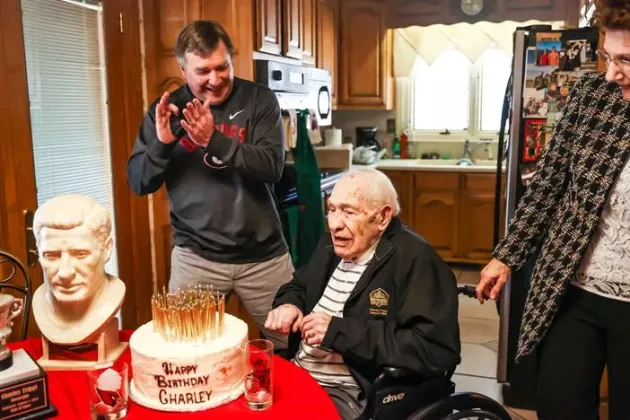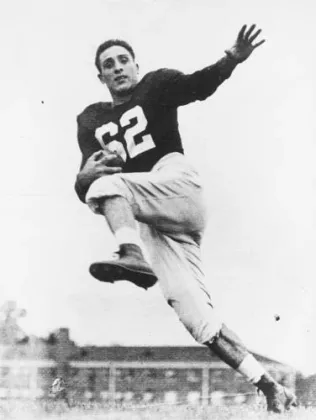ATHENS — University of Georgia legend Charley Trippi passed away at the age of 100.
According to Loran Smith Senior Associate Athletic Director Claude Felton, Trippi “died peacefully at his home in Athens” on Wednesday morning.
Trippi began earning Hall of Fame distinction as a sophomore by leading the Bulldogs to a 9-0 victory over U.C.L.A. in the 1943 Rose Bowl game in which he was named the game’s outstanding player after rushing for 130 yards.
Born Dec. 14, 1922, in Pittston, Pa., Trippi was a unanimous All-America selection in 1946 after leading Georgia to a perfect 11-0 record, SEC championship and victory over North Carolina in the Sugar Bowl game. In his senior season, he led the SEC in scoring with 84 points and finished the year with 1,366 yards total offense (744 rushing and 622 passing). He was the runner-up for the Heisman Trophy Award in 1946 and won the Maxwell Award, given annually to the most valuable player in the country.
He signed with the Chicago Cardinals following his collegiate career and in his rookie season, led them to the world championship. In the championship game, he scored twice on a 44-yard rush and a 75-yard punt return. He played with the Cardinals for nine seasons.
Following his playing career, Trippi was selected to the National College Football Hall of Fame (1959), National Pro Football Hall of Fame, Rose Bowl Hall of Fame, and State of Georgia Sports Hall of Fame (1965). He was also inducted into the University of Georgia Circle of Honor in 1996. Trippi is one of only four Georgia players to have his jersey retired.
Trippi was a star left halfback on Georgia’s unbeaten freshman team of 1941 and became a regular halfback on the 1942 SEC championship team that finished 11-1 and earned the Rose Bowl invitation. As a sophomore, he gained 1,239 total yards (672 rushing on 98 carries and another 567 passing completing 30 of 58).
He spent 1943-45 serving in the Air Force, but following his discharge, he returned to Georgia to play the final six games of the 1945 season. One of his most memorable performances was leading the Bulldogs to a 33-0 victory over Georgia Tech—a game in which he set the SEC record for yards gained passing (323) and also total offense (384 yards on 323 passing and 61 rushing). Against Florida that same year, he set the SEC record for rushing in a single game with 239 yards. In his junior season, he led Georgia to a 20-6 victory over Tulsa in the Oil Bowl at Houston, on Jan. 1, 1946.
Trippi was also an All-America baseball player in 1946 and played with the Atlanta Crackers in 1947. He hit .334 with the Crackers while still in school at UGA in the spring of 1947. He later served as an assistant coach at Georgia (1958-62) and with the St. Louis Cardinals.
Georgia head coach Kirby Smart surprised Trippi on his 100th birthday last year on Dec. 14. The Bulldogs would go on to win their first national title in 41 years less than a month later by defeating the Alabama Crimson Tide 33-18 on Jan. 10.
“I was really overwhelmed,” Smart said in a statement, per a press release by UGA. “He was perhaps the greatest all-around football player on our campus. Many historians and observers have said that. And from reading about him, I understand why. He is proud to be a Bulldog. His legacy, like that of so many of the great players who have come through here, has enabled us to develop one of the great traditions in college football.”
Editor’s Note: The University of Georgia Athletic Association also contributed to this article.


